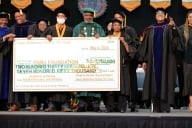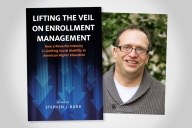You have /5 articles left.
Sign up for a free account or log in.
In the 1930’s, American businesses were locked in a fierce economic competition with Russian merchants for fear that their communist philosophies would dominate American markets. As a result, American competition drove the country into an economic depression and the only way to pull them out of it was through civil cooperation. American president Franklin Delenor Roosevelt advocated for civil unity despite the communist threat of success by quoting "the only thing we need to fear is itself," which desdained competition as an alternative to cooperation for success. In the end, the American economy pulled out of the depression and succeeded communism.
Does that paragraph read like an excerpt of an essay with "reasonably consistent mastery" and that "effectively develops a point of view" and "demonstrates strong critical thinking, generally using appropriate examples"? Those are the College Board's descriptions of the kinds of qualities that earn an essay a score of 5 (the second highest possible) on the essay portion of the SAT, a new and controversial part of the exam. And that is the score an essay with that paragraph (all punctuation, spelling, FDR's new middle name and other "facts" verbatim) received from two readers when a student submitted it in October, having been coached on how to do so by a professor at the Massachusetts Institute of Technology.
Les Perelman, the professor, is among the many writing experts who fear that the new essay portion of the SAT and the push to use standardized testing for writing are harming American students. Perelman has had various skirmishes with the College Board on the issue, with each side offering analyses of the test. Perelman helped a student (over the age of 18 and with informed consent, he is quick to add) take the SAT in October, intentionally paying no attention to whether any historical facts he cited were correct, following certain formulas (including examples from the arts and history, but not worrying whether they make sense), and including key words that the SAT scoring teams are thought to favor ("plethora" and "myriad" are both considered tops -- and this essay featured both).
Perelman -- director of the Writing Across the Curriculum Program at MIT -- revealed his efforts Friday at the annual meeting of the Conference on College Composition and Communication, in New York City. Perelman spoke on a panel exploring the impact of large-scale standardized testing on writing, and was among several experts who warned that the current push to assess writing -- while in some cases well intentioned -- may be discouraging student learning.
Attendees at the session were given the full text of the essay ( which you can see here) and a passionate speech by Perelman about the problems with the writing exam. While many colleges have said that they don't think the new essay adds much (and many institutions that use other parts of the SAT don't use the writing scores), Perelman issued a "call to arms" for educators to not just ignore the essay, but to try to kill it. "It does harm," he said repeatedly in his talk, which was illustrated with slides (received with chuckles and applause by the audience) comparing the College Board to snake oil salesmen. Mixing metaphors a bit, Perelman said colleges must "chase the money changers from the temple" of higher education.
The essay is harming students, Perelman said, because it rewards formulaic writing that views the world as black and white, isn't based on any facts, and values a few fancy vocabulary words over sincerity. He also said that while most college instructors work to "deprogram" students from the infamous "five paragraph essay" they learned in high school, the SAT test reinforces that approach. Perelman and others noted that the problem isn't limited to the time students spend actually taking the SAT, but that many students devote months or years of study with coaching services to learning how to write the way the College Board wants -- and with students fearful that a poor score will hurt their chances of college admission, they focus on that kind of writing.
He drew particular attention to the way the College Board has openly stated that students are not penalized for not getting their history correct. "This is a total disregard for the facts," he said.
The skills students learn to do well on the SAT "obliterate the writing process," he said. "They encourage false dichotomies. They discourage history. You are punished for taking time to think."
Perelman also distributed the list he gives students of tips for how to do well on the essay. He advises people to include at least one quote from history, regardless of whether it is relevant or accurate -- and he reports that this seems to work. The advice he gives is summed up on his handout: "Basic assumption: The essay is a completely artificial and unnatural piece of writing."
Other speakers at the forum related the writing test to various state mandates for testing, the No Child Left Behind legislation, and to some of the ideas of the Spellings Commission about measuring what colleges actually learn. Speakers said that they weren't against assessment, but against mass assessment. Statewide and national systems, they said, end up having all kinds of unintended consequences -- most of them negative for education.
College Board officials said that they could not comment on the implications of Perelman's testing experiment, in part because they couldn't verify that the essay he distributed had in fact been turned in. They stressed that an essay would never be judged by just one part, but in a "holistic" way. But they said that the essay subject -- on whether competition or cooperation is best to produce success -- resembled a recent essay. And they said that the way Perelman described how the student obtained his essay after the test was accurate and consistent with College Board procedures.
Judson Odell, a senior content specialist at the College Board, said that Perelman's tips on how to do well on the test were not accurate, and that in fact, students are better off looking at the College Board's advice, which is more oriented to writing.
The College Board "has spent a lot of time and money to ensure that the construction and grading of essays is of extremely high quality," Odell said, and many of the ideas about the essays and scoring come from writing experts -- including high school and college writing instructors.
While College Board officials have previously said that students are not penalized for factual errors, Odell offered a more limited guideline, saying that students would not be penalized for "minor factual errors." He said that the essay must be viewed as a "first draft," so such a policy is appropriate.
Asked about the essay Perelman distributed, and whether its characterization of FDR's famous inaugural speech was just a "minor factual error," Odell said he couldn't comment.








